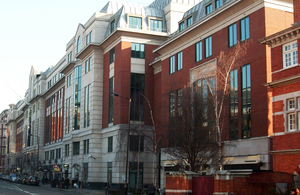£101 million bus boost for passengers
More low carbon buses and better partnerships to increase growth and cut emissions.

Commuters and bus passengers across England will see more eco-friendly buses on the roads, congestion reduced and services upgraded, thanks to a new £101 million package of improvements approved by Local Transport Minister Norman Baker.
Today’s (23 March 2012) announcement will see:
- £31 million spent on 439 low-carbon buses, part of the government’s Green Bus Fund which aims to bring down fuel emission and air pollution levels and encourage bus operators and local councils to make the switch to hybrid-electric, fully electric or gas buses.
- Winning local authorities across England will also receive a share of £70 million under the Better Bus Areas (BBAs) fund to boost growth, improve partnerships with bus companies and increase bus passenger numbers.
Local Transport Minister Norman Baker said:
This funding means a better deal for passengers and encourages more people to travel by bus. It updates and improves services and infrastructure, reduces congestion, gives quieter journeys and with the introduction of new carbon friendly buses, reduces fuel costs and CO2 emissions, creating a greener network.
The £70 million will be shared between 24 local authorities who have impressed the department with their bid for funding. They will benefit from up to £5 million each. This will support a range of targeted improvements including:
- smarter multi-operator tickets
- traffic lights that can help buses beat the queue
- real time information
- improvements to shelters and stops
Following a 2 month bidding process the department has also provided funding for 439 new eco-friendly buses for 2012 to 2013. Passengers will see 128 single-decked and 311 double-decker buses in service from spring 2013, saving over 9,000 tonnes of carbon dioxide (CO2) emissions per year. The 26 bus operators including Stagecoach, Arriva and First are receiving more than £22 million, with more than £8 million split between 5 local authorities.
Five bus manufacturers will benefit from orders for their eco-friendly hybrid, electric and gas buses. They comprise: Volvo, Wrightbus, Optare, MAN and Alexander Dennis Limited, all of which are based in, or partly in, the UK.
By switching to low-carbon buses, the winners will also be eligible to claim additional government subsidy through the Bus Service Operators Grant to run these buses. Bus operators and local authorities will be given 6 pence per kilometre to support them with operational costs.
Notes to editors
For further information, to organise an interview with Local Transport Minister Norman Baker or to request a regional fact sheet with a breakdown of all the winners, please email [email protected] or call 0207 944 4342.
Better Bus Area Fund: Further information on the winners, the projects and funding breakdown.
The department has made available an additional £20 million on top of £50 million to improve local bus services under the Better Bus Area fund.
All bids were assessed on how well they promoted growth, reduced carbon and encouraged partnerships between local authorities and bus operators. The projects were also assessed for deliverability, financial sustainability and value for money.
Green Bus Fund: Further information on the winners and projects.
The local councils who will receive funding include: Nottingham City, Transport for London and Greater Manchester, Milton Keynes and Nexus.
Round 3 was launched on the 19 December 2011. The closing date for bids was the 10 February 2012. Scotland is holding a separate £2 million competition.
The budget for round 3 of the fund was increased from £20 million to £31 million with the additional funding coming from savings and under spend found elsewhere in government.
This is the third round of the government’s Green Bus Fund and operators were allowed to bid for up to 80% of the cost difference between the low-carbon bus and its diesel equivalent. Round 1 was launched in 2009 and paid up to 100% of the difference, with round 2 paying up to 90%. The number of bids received has increased each time with councils and operators realising the long-term financial, practical and environmental benefits of low-carbon buses. Further details on round 1 and 2.
By switching to low-carbon buses, the winners will also be eligible to claim additional government subsidy through the Bus Services Operation Grant to run these buses. Bus operators and local authorities will be given 6 pence per kilometre to support them with energy and fuel costs. These payments are set to continue in 2013.
A diesel hybrid electric bus runs on a combination of diesel and a battery. Gas buses funded through the Green Bus Fund will run on 100% biomethane.
The total grant amount offered to operators and councils is £30,931,160. For grant offered broken down by operator or local authority.
Each year, every low-carbon bus in London saves around 26 tonnes of CO2 compared with its diesel equivalent, with buses outside London estimated to save around 22 tonnes.
Regional releases/fact-sheets
- East midlands (PDF, 20KB)
- East of England (PDF, 23KB)
- London (PDF, 14KB)
- North east of England (PDF, 18KB)
- North west of England (PDF, 19KB)
- South east of England (PDF, 24KB)
- South West England (PDF, 20KB)
- West midlands (PDF, 18KB)
- Yorkshire and Humberside (PDF, 22KB)
Related documents
- Statement: additional funding for buses
- Green Bus Fund
- Better Bus Area Fund
News desk enquiries
Media enquiries 0300 7777 878
Switchboard 0300 330 3000